Key takeaways:
- Animal welfare involves not just survival but the ability of animals to express natural behaviors and live free from suffering, encapsulated in the Five Freedoms.
- Ethical consumption empowers consumers to make choices that support humane treatment of animals, fostering a deeper connection between food producers and consumers.
- The ethical marketplace encourages individuals to engage with brands that prioritize animal welfare, transforming consumer choices into acts of compassion.
- Practical steps for ethical buying include seeking transparent certifications, supporting local businesses, and exploring plant-based alternatives to reduce high-impact animal products.
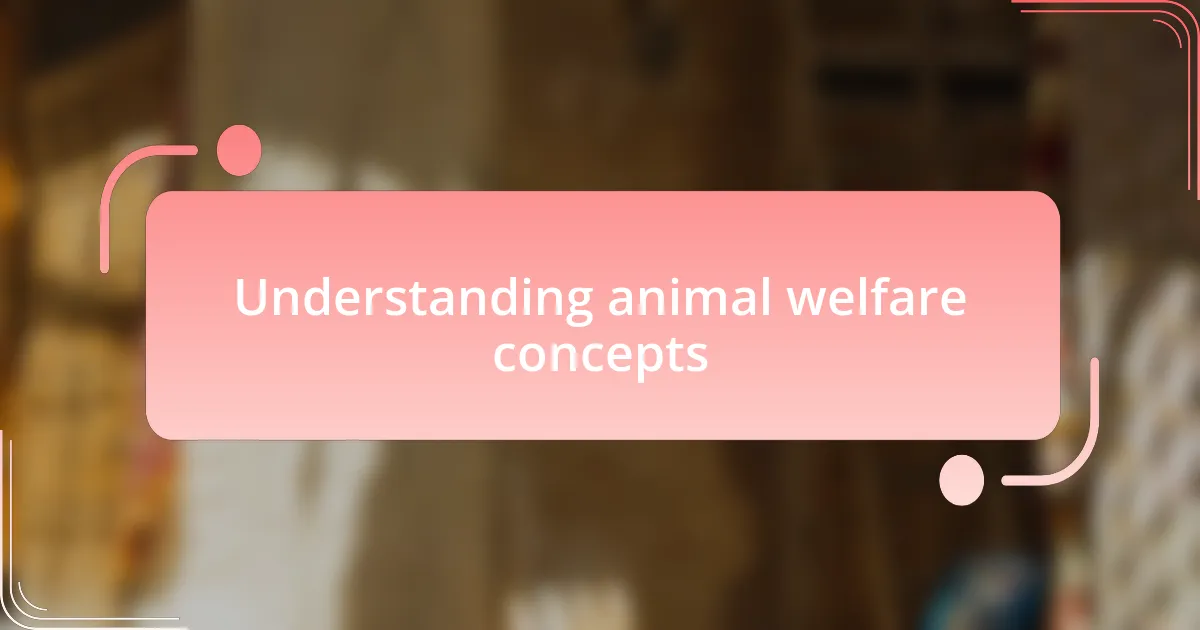
Understanding animal welfare concepts
Animal welfare encompasses a range of concepts that are crucial for understanding how we treat animals, especially in food production. It’s not just about keeping animals alive; it involves ensuring that they can express natural behaviors and live free from suffering. I often find myself reflecting on my own choices—when I opt for ethically sourced meat, I feel a sense of connection to the well-being of those animals, as if I’m contributing to a more humane system.
One critical aspect of animal welfare is the Five Freedoms, which outline the basic needs of animals: freedom from hunger and thirst, discomfort, pain, fear, and the ability to express natural behaviors. When I first learned about these principles, it was eye-opening. It made me realize that my purchasing decisions have direct consequences on the lives of animals. I often ponder, how would I feel if the roles were reversed? This perspective shifts how I view animal agriculture and consumption.
Moreover, understanding animal welfare also involves recognizing the psychological state of animals. For instance, farm animals often experience a range of emotions, including fear and stress, and these factors are just as important as their physical health. Reflecting on my encounters with animals at sanctuaries fills me with emotion, as I see happier, more relaxed creatures enjoying their lives. Isn’t it worth considering how our choices impact their reality?
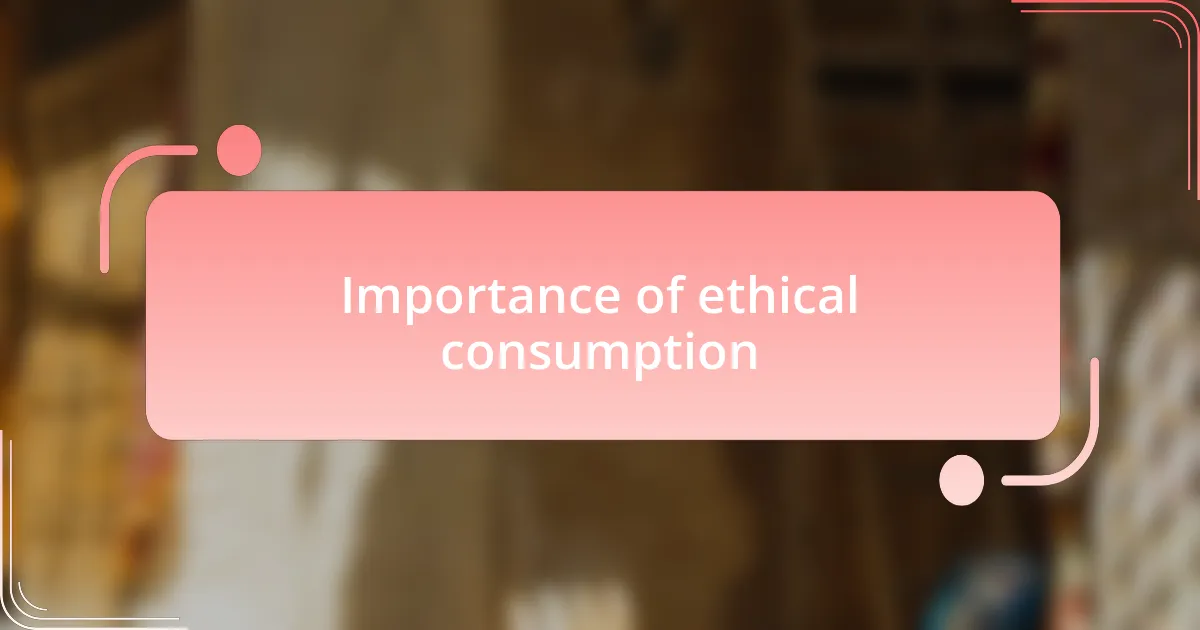
Importance of ethical consumption
Ethical consumption is vital because it allows us to support systems that prioritize animal welfare. When I make the choice to buy products from farms that adhere to humane practices, it’s not just a transaction; it feels like I’m casting a vote for a kinder approach to food production. I often think about the ripple effect of these choices, knowing that each ethical purchase encourages better treatment of animals.
I remember the first time I visited a local farm that champions ethical practices. The open fields and animals roaming freely made such a stark contrast to industrial farms I had seen before. It struck me how happier animals translated into better quality meat, and I realized that my health is intertwined with their welfare. Wouldn’t most people want their meals to come from animals that lived fulfilling lives?
At its core, ethical consumption fosters a deeper connection between consumers and the sources of their food. It prompts us to reflect on what we value and who we wish to support. I often ask myself, what kind of legacy do we want to leave for the next generation? If we can encourage a culture of compassion through our buying habits, we might inspire a future where ethical treatment of animals isn’t the exception, but the norm.
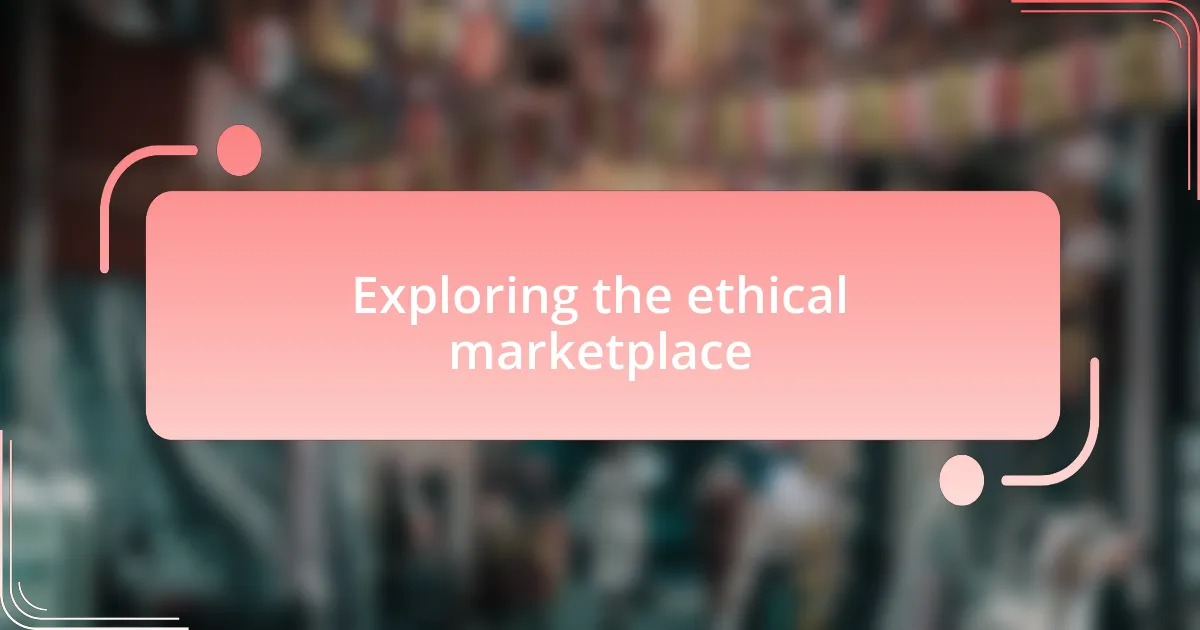
Exploring the ethical marketplace
Exploring the ethical marketplace reveals a transformative landscape where consumer choices can drive significant change. The first time I navigated an ethical marketplace, I felt a profound shift in my perspective. Instead of being overwhelmed by options, I felt empowered knowing every selection supported farmers who prioritize humane treatment. Isn’t it inspiring to think that our purchases can actively contribute to a growing community that values animal welfare?
As I began to embrace this approach, I discovered the rich stories behind the brands I chose. Each label told a tale of dedication, one that resonated with my beliefs about sustainability and kindness. I recall chatting with a vendor who shared heartfelt details about their rescue animals, reinforcing my belief that supporting ethical practices is about more than just food; it’s about fostering a compassionate lifestyle. How can we ignore such connections when we shop?
The ethical marketplace is not just a trend; it’s a movement inviting us to join a larger conversation about responsibility and care. I often reflect on how even small changes in our buying habits can resonate beyond our immediate choices. Wouldn’t it be amazing if every shopping trip felt like a chance to create positive impact? By engaging with this marketplace, we can all contribute to a narrative that champions the dignified treatment of animals and, in turn, enriches our lives.

Personal reflections on animal welfare
Reflecting on animal welfare has really shifted my understanding of our food choices. I remember a moment during a farm visit when I saw a group of pigs frolicking in a green pasture, living freely instead of confined to small pens. It struck me how much happier they were, reminding me that a life well-lived is a right we often take for granted in these discussions.
I often ponder the emotional weight of knowing where our food comes from. Last summer, I met a local farmer who shared stories about his commitment to ethical practices. Listening to him explain how he treats his animals with respect made me realize that every product carries the essence of the life it came from. It makes me question: how often do we acknowledge the impact of our choices on these sentient beings?
At times, I’m overwhelmed by the complexities of supporting animal welfare in consumption. Yet, even small steps towards sourcing ethical products feel significant. I find myself asking, what if we all took a moment to consider the lives behind our meals? Engaging with this notion not only deepens my appreciation for the food I consume but also fosters a sense of community that values compassion and responsibility.
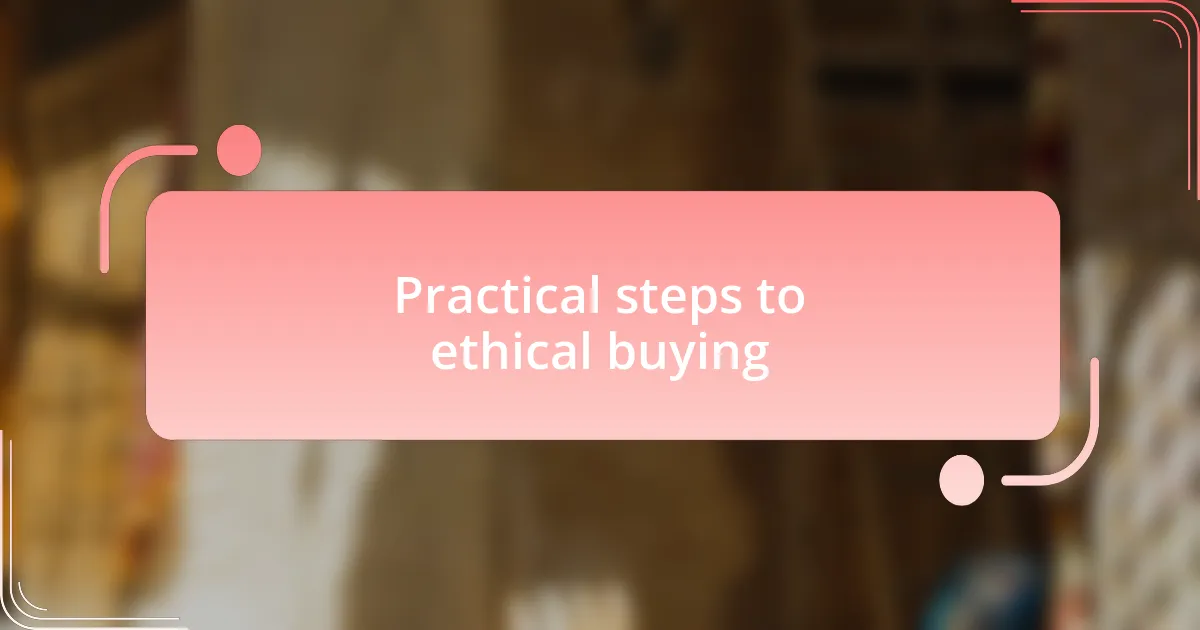
Practical steps to ethical buying
When it comes to ethical buying, I’ve learned that transparency is key. I often make it a habit to delve into the brands I purchase from, seeking certification labels that assure humane treatment. The first time I chose eggs from a local farm with a high animal welfare rating, I felt a wave of relief knowing those hens had access to the outdoors. Isn’t it reassuring to think about the tangible difference our informed choices can make?
Another step I embrace is supporting local businesses. During a recent visit to a farmer’s market, I connected with a vendor who sustainably raised his livestock. I couldn’t help but feel a sense of pride in knowing my purchase directly supported his commitment to animal welfare. How gratifying it is to contribute to a cycle that values both community and compassion!
Lastly, I actively reduce my consumption of high-impact animal products. I remember my first experience with a plant-based meal; it unexpectedly opened my eyes to delicious alternatives. What if we all experimented with more plant-based options? I believe each small change, like opting for a meatless Monday, can lead to significant benefits for animal welfare and the environment alike.
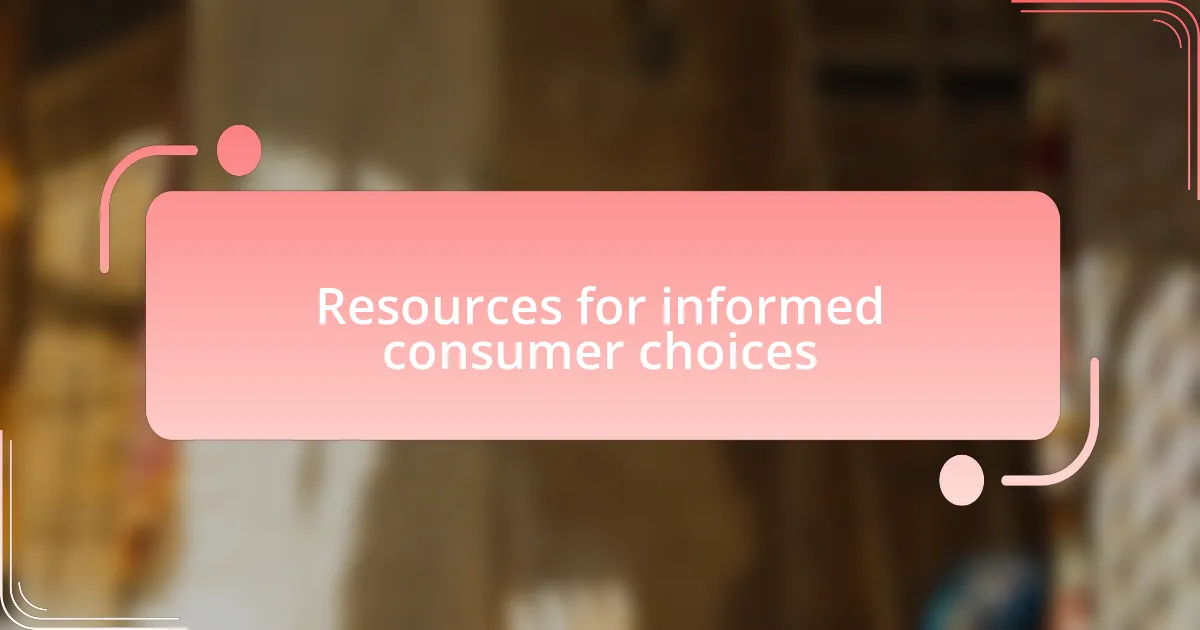
Resources for informed consumer choices
When it comes to making informed consumer choices, I often turn to resources like animal welfare organizations and online databases that rate farms and brands. For instance, I came across a website that lists humane certifications and provides ratings for various animal products. It was eye-opening to see how some brands I trusted didn’t meet the standards I thought they did. Have you ever had that moment of realization? It’s a powerful reminder to dig deeper.
Another valuable resource I appreciate is documentaries that explore animal welfare practices. I vividly remember watching one that showcased the stark differences between factory farming and sustainable practices. It stirred an emotional response in me and propelled me to be more mindful in my purchasing decisions. Isn’t it fascinating how a single film can reshape our thoughts and actions?
Furthermore, I find community discussions and blogs immensely helpful. Engaging with others who share a passion for ethical eating can lead to incredible insights. Just the other day, while participating in an online forum, I discovered a local co-op that sources from ethical farms. The sense of community support you feel while sharing these discoveries is invaluable, wouldn’t you agree?